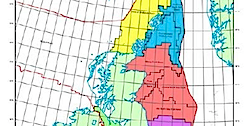More than three billion barrels of oil equivalent (boe) remain in about 350 unsanctioned discoveries across the UK Continental Shelf (UKCS), according to information released by the Oil and Gas Authority (OGA).
Of the three billion barrels, the majority are “small pools” defined as less than 50 million barrels of oil equivalent and are technically recoverable.
The OGA said these pools are “located within potential tieback and/or extended reach drilling distance to existing infrastructure.”
However, the OGA said a number of the small pools lie further away from existing infrastructure and “therefore could require stand-alone type solutions to recover hydrocarbons.”
Gordon Drummond, project director of The National Subsea Research Initiative (NSRI) said: “Small pools have a national importance in terms of achieving MER (maximise economic recovery) and they must be considered as an industry asset if they are to be capitalised upon.
“Following an extensive mapping exercise, we now know exactly where these small pools are located and what is required to unlock their potential.
“If the subsea industry can rise to the challenge of economically tapping into these pools, the North Sea could have a whole new lease of life.
“Technology is only part of the solution — the industry must be much more receptive to innovate.
“There must be a willingness to work more collaboratively on multi-field applications and on access to infrastructure.”
The analysis was completed using detailed maps of the discoveries and was developed by the OGA as part of the Technology Leadership Board’s (TLB) Small Pools Work Group, supported by The National Subsea Research Initiative (NSRI), Centrica, EnQuest and The Industry Technology Facilitator (ITF).
Carlo Procaccini, OGA head of technology, said: “We recognise the challenges operators are facing to develop these marginal oil and gas accumulations.
“Small pools represent a very significant opportunity to maximise economic recovery (MER) from the UKCS.
“Technology has an important role to play to reduce the cost of development wells, design optimised subsea infrastructure to existing host facilities and develop efficient standalone concepts.
“We are committed to working together with the industry, the TLB and the new Oil and Gas Technology Centre (OGTC) which has dedicated one of their Solution Centres to unlock the small pools potential.”
bout 330,000 jobs across the UK are still currently supported by the offshore oil and gas industry, down from a peak of about 450,000 jobs in 2014.
The report said more than 43 billion barrels of oil equivalent (boe) have been recovered since first production in 1967 and that UK Oil & Gas believes there are still between 10 billion and 20 billion more to be recovered.
The report said industry efficiencies are driving a 45% drop in the cost of extracting a barrel of oil or gas from the UKCS.
It said production was up by 10.4% in 2015, the first increase in 15 years, but that major challenges remain, with record low exploration and a lack of capital investment.
